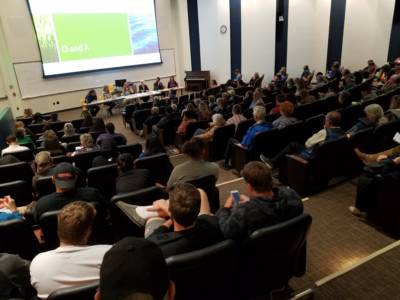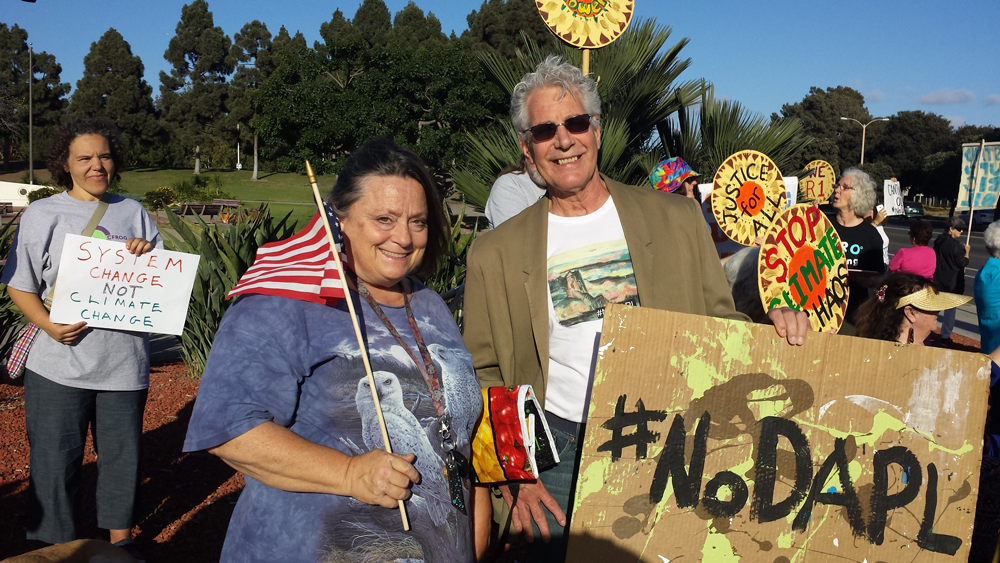Numerous signers of the following cover letter were among over 110 attendees at the Ventura College Climate Action Summit on Tuesday, April 24, 2018 to hear Dr. Omar Clay present the latest science about climate change. A panel reported on local action. Kimberly Rivers, Executive Director of Citizens for Responsible Oil and Gas (CFROG) encouraged people to tell Ventura County what they want in the General Plan Update and Climate Action Plan. There was serious discussion about the most important policies to be advocating.
April 12, 2018 (signatures updated to 41)
Dear Ventura County Supervisors and Planning Commissioners,
The 350 Ventura County Climate Hub submits policy suggestions for the Climate Action Plan and intersecting chapters covering water, wastewater, storm water, housing, transportation and environmental justice. Our scope follows the CARB Scoping Plan to achieve the state’s climate goals.
Our first guiding principle is to aim to do our part to achieve a stable climate. We ultimately demand that there be accountability for climate action toward goals supported by science, i.e. beyond the political goals provided in the VC2040 GPU Background Document. Simply put, carbon dioxide levels must be restored to 350 parts per million. Global desertification with the reduction in small local rainwater cycles must be reversed to aid in sequestering legacy carbon currently in the atmosphere and ocean and to halt the spread of mass migration.
Our second guiding principle is that we can’t set goals without baselines provided by a comprehensive, reliable inventory of our emissions and our carbon sequestration capacity. The county’s “Climate on the Move” is a good start in assembling data regarding current inventories produced by local jurisdictions. The assembled inventories need further work before we can develop what we believe is the most cost-effective mix of measurable goals and targets.
We know with certainty, however, that the GHG emissions from tailpipes must be drastically reduced to meet legally binding state targets. California must achieve a 32 per cent reduction in per-capita driving by 2030 (relative to 2005) if we are to meet our responsibilities to stabilize the climate. A big part of the needed reduction will need to come from car-parking reform. The first step should be a simplified demonstration project of a Dividend-Account Parking System at county employee parking lots. This project would educate owners of parking lots concerning this potent measure to incentivize decreased driving.
A second urgent issue is the water shortage. Our input to the Water Chapter is cross-referenced in the Emissions and Carbon Sequestration sections of the Climate Chapter. At the Planning Department’s Water Focus Group on March 19, water district leaders were looking for wide latitude in terms of strategies, but much stronger county leadership to help them plan for the worst case scenario. This scenario, obviously, is that there isn’t enough state water in the long term to share with Ventura County.
The water shortage is vital from a climate action perspective. Beyond our biological and economic need for water and for field supported tiered rates is the need to collectively achieve greater conservation. We want to point out this fundamental reality: we cannot sequester carbon or contribute to a reduction of extreme surface temperatures and flooding without very different county management of rainfall and irrigation. Therefore, we ask that you read our suggestions for the Water Chapter with an open mind. These policy suggestions need much more research and discussion; however, they help us imagine the kind of paradigm shifts that we envision, such as wastewater recycling for potable use; building codes that allow dry toilets and increased greywater use; upland restoration of small water cycles; and regenerative farm practices that simultaneously hold water and carbon.
These examples of policy for various systems–parking, wastewater, storm water, and biological agricultural–illustrate what we believe are three overarching principles:
- Inconvenience. Some powerful strategies require radical changes in behavior—many may say ‘inconvenience’. Many of our suggestions are in this category.
- Reversals of policy and practice. Some essential strategies require the reversal of certain long established zoning patterns, ordinances, codes and accepted practice.
- County leadership for broad community engagement and involvement. The most powerful strategies require a radical new level of community engagement. For example, we heard a county water management staff person say that the restoration of small water cycles in the uplands that we propose can only be “done by the grassroots”. So be it. We must have county leadership to mobilize the grassroots! That must be the motivating spirit of the Climate Action Plan.
We have heard Supervisor Bennett say on more than one occasion how unique this county is—the mix of geographic features and social identity can be leveraged to accomplish visionary policy not possible in most localities. Despite some friction on some issues, there is a framework and a tendency for the cities to look to the leadership of the county.
Ventura County’s size and diversity of ecosystems gives it potential as a model for demonstrating how to reduce emissions and sequester carbon by expanding soil-carbon sponges in urban, agricultural, and open spaces. You will see in the Carbon Sequestration section of our policy input Goal A referencing the CA Department of Conservation “Land Management and Multi-Benefit Assessment Tool” (to be completed during 2018 for use by all counties). The team testing the tool in Merced County has offered to present it to us. We would like to collaborate with the Planning Department and any other interested organizations on such a workshop on mapping and carbon sequestration tracking, as well as the relationship between the Water Management Plan and a Carbon Sequestration Plan. We also want to work with the Planning Department on a workshop about parking policy to reduce per capita driving.
To conclude, county leadership at an entirely new level is necessary to achieve the VC2040 vision and guiding principles along with a scientifically and legally defensible Climate Action Plan integrated into the General Plan. That leadership must involve the cities, the water districts, and other institutions. It must engage the people and the youth in climate action now, not starting in 2020, to address the monumental intergenerational injustice of global warming.
Our work over five years building a climate action coalition is expressed with this illustration of potentially radical and inconvenient, but necessarily transformative policies that require your leadership. We pledge to continue to examine policy options among all stakeholders*.
Signed:
Jan Dietrick, Coordinating Team 350 Ventura County Climate Hub; Group Leader Citizens’ Climate Lobby, Ventura
Kitty Merrill, Coordinating Team 350 Ventura County Climate Hub; Chair 7PEAT Committee, Unitarian-Universalist Church of Ventura
Cindy Piester, Coordinating Team 350 Ventura County Climate Hub; peace and climate activist, Ventura
Todd Shuman, Senior Analyst, Wasteful and Unreasonable Methane Uprising; Coordinating Team, 350 Ventura County Climate Hub, Camarillo
Sigrid Wright, CEO/Executive Director, Community Environmental Council, Santa Barbara
Citizens for Peaceful Resolutions
Susan Cousineau, Ecologist and research lead for Slow Food Ventura County, Camarillo
Pat Browne, Nurse and Community Garden Organizer, Camarillo
Michelle Nosco, Executive Director, Arts for Earth Foundation, Ventura
Michelle Ellison, Clean Energy Advocate, Ojai
Ron Whitehurst, PCA, Rincon-Vitova Insectaries; Chairman of the Board, Ventura Food Coop; Coordinating Team 350 Ventura County Climate Hub, Ventura
Vicki Paul, Citizens’ Climate Lobby and CCL Mentor to Pacific Island Territories, Ventura
Faith Grant, Citizens’ Climate Lobby, Thousand Oaks
Tom Seigner, Citizens’ Climate Lobby, Thousand Oaks
Arturo Guido, Citizens’ Climate Lobby, Oxnard
Adam Vega, Community Organizer, CAUSE; Californians for Pesticide Reform; The Abundant Table, Camarillo
Kristofer Young, DC, Functional Medicine Chiropractor, Ventura Chiropractic & Massage
Ally Gialketsis, Food Recovery and Hunger Relief Activist, Ojai Valley
Jeannette Welling, Climate Activist, Thousand Oaks
Diana H Goodrow, Ventura County Coordinator, WIN/CAWA, Oak View
Carol Gravelle, Clean Energy Advocate and Graphic Designer, Camarillo
Steve Sprinkel, Ecological Farming Association Board Member; President, Ojai Center for Regenerative Agriculture
John W. Roulac, Founder and Chief Visionary Officer Nutiva; Co-producer Kiss the Ground Film
Janet Murphy, Climate Activist, Moorpark
Robert Jefferson, Small Business Owner, Thermo Tools Vacuum Forming and Fabrication, Ventura
Kristin Storey, Educator in Oxnard, resident of Ojai
Mary Olson, Peace and Climate Activist, Ventura
Carol Vesecky, Carbon Grower and Director, Biointensive for Russia, Ojai Valley
Tim Nafziger, Oak View
Kathy Bremer, Ventura
Anthony Krzywicki, Co-Coordinator, Green Party of Ventura County
Brett Levin, Masters of Environmental Management Candidate, 2019, Yale School of Forestry and Environmental Studies
Vickie Peters, Member Ojai Valley Green Coalition, Ojai
Mike Bullock, Statewide Climate-Transportation Activist, Oceanside
Noah William Aist, 15 year old college student and bicycle commuter
Patty Pagaling, Director, Transition to Organics Ojai
Pat Browne, Nurse; Community Garden Leader, Camarillo
Tomás Morales Rebecchi, Organizer with Food and Water Watch, Board Member Citizens for Responsible Oil and Gas
Jackson Piper, Urban Planner, residing in Newbury Park
Alan Weiner, Group Leader 350 Conejo Valley
Emmma Aist, 17 year old Community College Student and Apprentice Biodynamic Chicken & Veggie Farmer; Ventura
Christopher Ball, Biological Pest Control Technician, Ventura
Elizabeth Garcia, Biological Pest Control Technician , Oxnard
Ventura Land Trust, Executive Director, Derek Poultney
(Signatories to this letter do not necessarily endorse every specific recommendation that is being submitted. Greater consensus will be achieved over the coming months.)


